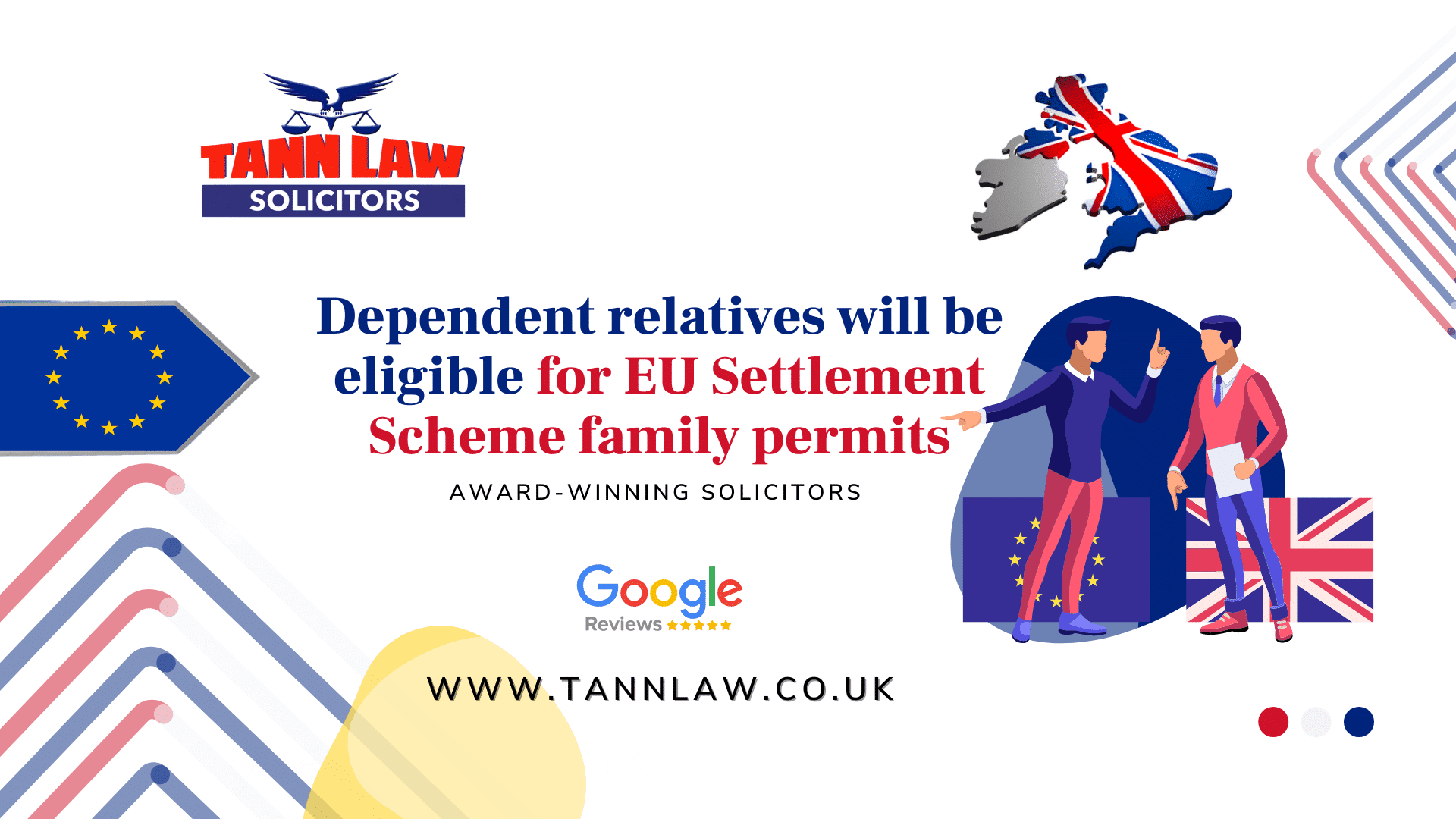Dependent relatives will be eligible to apply for EU Settlement Scheme family permits. Generally, your family member must obtain an EU Settlement Scheme family permit in order to enter the UK. They are not need to obtain a permit if they hold a valid family, work, or student visa. They must be outside the United Kingdom in order to apply for the permit. Application for the permission is completely free. Your family member may apply for the permission only if you are settled or pre-settled.
The agreements reached by the United Kingdom on the post-Brexit rights of EU, EFTA, and Swiss residents allow beneficiaries to sponsor non-European family members to live with them in the United Kingdom after Brexit. There are two sorts of family members who are eligible for benefits:
Families are divided into two groups: direct family members (spouses, civil partners, children, and dependent parents), who account for the vast majority of family reunion cases; and extended family members (which includes (1) unmarried partners and (2) other more distant relatives such as siblings and cousins who are dependent on their sponsor).
Because the rules for unmarried partners within extended family members vary from one another, this article will only discuss the situation for the second category of people, dependent relatives.
Permissions allowing dependant relatives to live with their families
To accompany their sponsor to the United Kingdom, dependent relatives must get a form of visa known as a family permit. Prior to the Brexit, these were referred to as EEA family permits. They are referred to as EUSS family permits in the post-Brexit era.
Article 10(3) of the Withdrawal Agreement between the United Kingdom and the European Union requires the Home Office to consider EEA family permit applications from dependent relatives as long as they are submitted by December 31, 2020. However, the government set a second deadline of July 1, 2021, to complete the project. Even though the Home Office continued to process EEA family permit applications after that date, it no longer issued the actual permits to those who were successful. It also advised applicants that any EEA family permits that had already been obtained but had not yet been used for travel to the United Kingdom were no longer in effect.
The Home Office’s approach was to assess whether someone satisfied the criteria for an EEA family permit instead of if they met the requirements for an EEA family visa but could not obtain one because the decision was made after June 30, 2021. Due to the fact that dependent relatives have never been eligible for EUSS family permits, this was an ultimately fruitless effort. The net result was that, while the Home Office was fulfilling its obligations under the Withdrawal Agreement to review applications from dependant relatives, anyone who was granted was denied the opportunity to join their sponsor in the United Kingdom.
As you might expect, civil society, solicitors, the European Commission, and the Independent Monitoring Authority were all of the opinions that this method, while only slightly in violation of the Withdrawal Agreement, was nonetheless unacceptable. When it came to preventing dependent relatives from falling through the cracks, the Home Office agreed that something needed to be done. It has now revised its instructions, which marks the beginning of the process of addressing the problem.
Allowance for the issuance of EUSS family permits
The guidance establishes a temporary concession in the event that the applicable Immigration Rules are changed in the future. Three scenarios are specified in the concession, and caseworkers are instructed to award EUSS family permits to dependent relatives who have applied for EEA family permits by the end of 2020 in three situations:
There are those who fit the requirements to be awarded an EEA family permit but who were unable to obtain one since the decision on their application was made after June 30, 2021. Non-pending applications that receive a favourable conclusion should be included, as should those who have successfully appealed previous denials of their applications.
Those who were awarded EEA family permits on or after June 1, 2021, and who “have contacted the Home Office to inform that they will not be able to travel to the United Kingdom before June 30, 2021” are eligible. I hope this is a forward-looking statement rather than a retrospective one.
Those who were awarded EEA family permits before June 1, 2021, and who “have contacted the Home Office to advise that they would not be able to come to the United Kingdom by June 30, 2021, and that there are compelling practical or humane grounds for doing so.” These include factors associated with the Covid-19 outbreak.
Because of the additional documentation necessary, those in the third group are most likely to be denied entry to the United Kingdom. It will be interesting to see how flexible the Home Office is in this regard and whether persons who are deemed not to fit the “compelling practical or compassionate reasons” criterion will be able to file an appeal in the future (if not, more judicial reviews beckon).
Do you require legal advice on EU Settlement Scheme family permits?
Make an appointment for a conversation at a time that is convenient for you.
GET IN TOUCH WITH US
The guidance does not specify how the applicant is required to contact the Home Office to explain why they were unable to go, which is a very major omission from the document.
Before issuing the EUSS family permit, the Home Office is required to determine if there has been a “substantial change in circumstances,” according to the instructions provided. The case offered is one in which the sponsor has passed away.
It appears improbable that many sponsors have passed away in the four months since June 30, and it is unclear whether the Home Office intends to conduct systematic checks on material changes in circumstances for each and every case in the future.
Given that all these families have already endured, we would hope that no further obligations placed on them would cause them to be separated for an extended period of time.
Is the issue resolved?
I have stated that this is merely the beginning of a cure. Despite the fact that the concession allows dependant relatives to be given EUSS family permits, once they arrive in the United Kingdom, they are required to apply for pre-settled status under Appendix EU to the Immigration Rules within three months of their arrival. This is done in order to ensure their ability to remain for an extended period of time.
However, Appendix EU stipulates that dependent relations must be residing in the United Kingdom by the “defined date,” which is December 31 2020. They are not considered “joining family members” for the purposes of determining who is eligible to enter after this date.
The Home Office has admitted that additional reforms are required to make it easier for dependant relatives to live with them for an extended period of time. Unfortunately, at this time, there is no concession and nothing in the Rules that would allow this to happen to take place.

